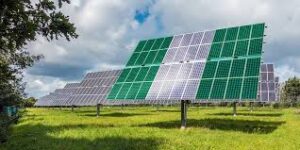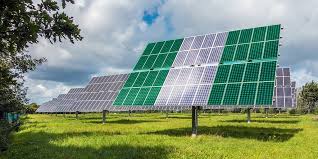Nigeria, Africa’s most populous nation, is taking bold steps towards a greener future by exploring a partnership with Chinese engineering giant Sinoma International Engineering Company. This move signifies Nigeria’s commitment to addressing climate change and embracing sustainable technologies, potentially reshaping its industrial landscape.

On Tuesday, a pivotal meeting took place in Beijing between Nigeria’s Special Presidential Envoy on Climate Action, Ajuri Ngelale, and top executives from Sinoma, including Board Chairman Yin Zhisong and President Zhu Bing. The focus of their discussions was on harnessing Sinoma’s expertise in eco-friendly industrial practices to boost Nigeria’s climate action efforts.
This potential collaboration comes at a critical time for Nigeria. The country, like many in Africa, faces significant challenges from climate change, including desertification in the north and flooding in coastal areas. By partnering with Sinoma, Nigeria aims to leapfrog older, polluting technologies and adopt cutting-edge green solutions.
Of particular interest to the Nigerian delegation were Sinoma’s advancements in decarbonizing mining operations. This is especially relevant for Nigeria, which has been working to diversify its economy beyond oil and gas by developing its solid minerals sector. Implementing greener mining practices could help Nigeria extract resources more sustainably, potentially setting a new standard for the continent.
The discussions also touched on automating manufacturing processes for critical green technologies. This could pave the way for Nigeria to become a hub for producing renewable energy components, creating jobs and fostering a new, sustainable industrial sector.
Ngelale’s interest in Sinoma’s innovations in carbon capture, utilization, and storage (CCUS) is particularly noteworthy. As Nigeria continues to rely heavily on fossil fuels, CCUS technology could offer a pathway to reduce emissions from existing infrastructure while the country transitions to cleaner energy sources.
The focus on wind blade production is also significant. Nigeria has vast potential for wind energy, especially in its northern regions. By partnering with Sinoma to produce wind turbine components domestically, Nigeria could not only advance its renewable energy goals but also create a new manufacturing industry.
This potential partnership reflects a broader trend of African nations turning to China for support in their climate action efforts. China, as the world’s largest producer of renewable energy equipment, is well-positioned to assist countries like Nigeria in their green transitions.
However, the collaboration is not without challenges. Critics may raise concerns about the terms of Chinese investments and the long-term implications for Nigeria’s industrial autonomy. There’s also the question of how these new technologies will be integrated into Nigeria’s existing infrastructure and workforce.
Despite these challenges, the potential benefits are significant. If successful, this partnership could accelerate Nigeria’s progress towards its climate goals, create new green jobs, and position the country as a leader in sustainable development in Africa.
The collaboration could also have regional implications. As the largest economy in Africa, Nigeria’s moves towards green technology could inspire similar efforts across the continent, potentially catalyzing a broader shift towards sustainable industrialization in Africa.
As discussions progress, key areas to watch will include the specifics of technology transfer agreements, plans for local capacity building, and how these initiatives align with Nigeria’s broader economic development goals.
This exploration of green technologies marks a significant step for Nigeria in its fight against climate change. By leveraging international partnerships and cutting-edge technologies, Nigeria is demonstrating its commitment to a sustainable future. The success of this initiative could not only transform Nigeria’s industrial landscape but also serve as a model for other developing nations striving to balance economic growth with environmental stewardship.




